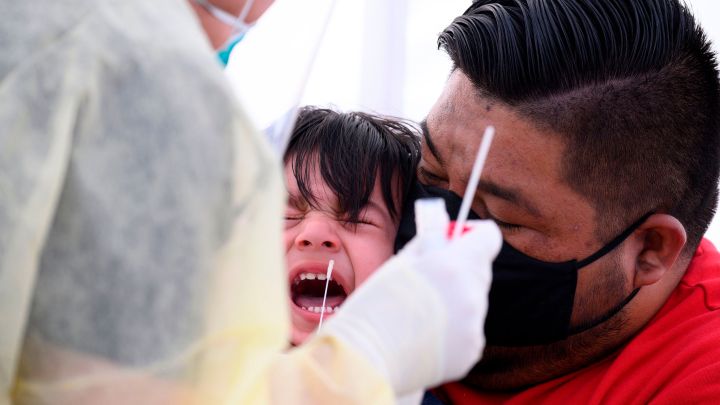
Complex, enduring economic factors put Latinx people at high risk for COVID
Complex, enduring economic factors put Latinx people at high risk for COVID

For a while, talk during dinner in Erika Cardenas’ home focused on trying to understand how she and her seven live-in relatives all got mild cases of COVID-19 in December.
“But I guess since everybody was working and everything, we can’t figure it out,” Cardenas said.
No hospitalizations, just coughing and fatigue mostly. She and the other adults work in retail, farmers markets, oil fields and local meatpacking plants.
CDC data shows Latinx people, like Cardenas, are disproportionately impacted by COVID-19 across the nation. They tend to be at a higher risk than white people for getting the disease, for hospitalizations, and for the risk of dying from COVID-19.
“I think there’s all these layers that sort of played together for the perfect storm,” said Dr. Michelle Barron, senior medical director of infection prevention for the Colorado-based UCHealth hospital system.
In Colorado’s Weld County, Latinx people make up 37% of reported cases despite making up about 30% of the total population, according to state health data and census estimates. Latinx people also made up more than half the COVID hospitalizations in one of the county’s two hospitals.
In Weld County, 70% of Latinx people work in “essential” jobs, census data show. Like Cardenas, many also live with multiple roommates or relatives.
“It’s like check, check, check — every risk you could potentially have, these groups generally did,” Barron said.
The county’s biggest outbreak site is a JBS meatpacking plant in the city of Greeley, with nearly 400 infections since the pandemic began and six deaths, according to state health data. Many plant workers are Latinx. Cardenas’ mom and aunt both work there. The meatpacking giant said it protects workers with things like face shields, staggered shifts and partitions.
“I believe that our interventions are effective,” said Tim Schellpeper, president of JBS’ Fed Beef Business Unit, which includes the Greeley plant. “They continue to be improved or are added to.”
The U.S. Occupational Safety and Health Administration fined the JBS plant in Greeley about $15,000 for failing to protect employees from exposure to COVID-19. The company has appealed that fine. And the firm is one of three meatpacking companies facing a congressional investigation for outbreaks nationwide.
More than 2,500 workers got vaccinated at the plant when the state’s fourth vaccination phase began on March 5.
Dr. Mark Wallace led Weld County’s health department until retiring in May. Preventing disproportionate infections in communities of color requires systemic change, he said.
“If you can’t earn a living, if you don’t have safe housing, if you don’t have access to food, if you don’t have transportation, you’re going to never have equitable health outcomes,” Wallace said.
Looking back, Cardenas said she isn’t sure her family could have avoided the virus. She said she worries about her community.
“You never know how much people you were exposed to and how much people you infected,” she said. “I am really sad.”
Colorado public health orders limited business operations to reduce COVID’s spread. But the Weld County Board of Commissioners released a statement saying county officials would not enforce those orders, encouraging “individual responsibility” instead.
There’s a lot happening in the world. Through it all, Marketplace is here for you.
You rely on Marketplace to break down the world’s events and tell you how it affects you in a fact-based, approachable way. We rely on your financial support to keep making that possible.
Your donation today powers the independent journalism that you rely on. For just $5/month, you can help sustain Marketplace so we can keep reporting on the things that matter to you.












